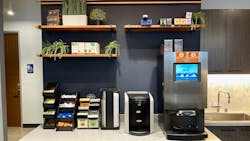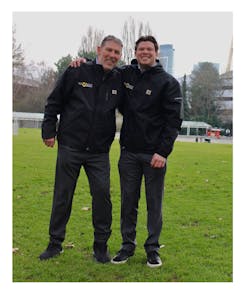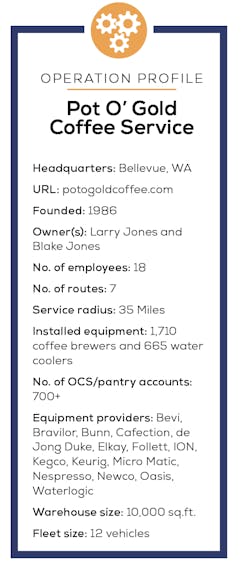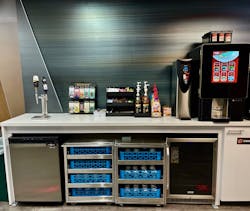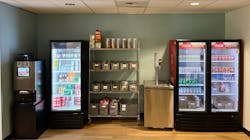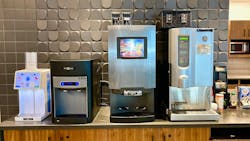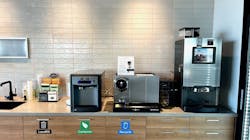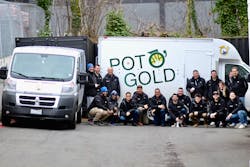Uncompromising service accelerates Pot O’ Gold’s rebound
As tough as these extraordinary times have been for office coffee service, one operator has managed to acquire 120-plus new customers since the start of the pandemic and is poised for the rebound to pick up pace with the start of the new year.
Serving the greater Seattle area, Bellevue, WA’s Pot O’ Gold Coffee Service was one of the hard-hit OCS providers, with sales plummeting 80% at the lowest point. However, the OCS operation is now making a steady comeback, recapturing 60% of 2019’s pre-pandemic sales level in the third quarter of 2021 with sales growing daily.
Second-generation operator Blake Jones attributes much of the company’s recent growth in new accounts to its competitors not maintaining prior service levels and standards, and others who were forced to close shop and leave the market.
“A lot of our competitors let their service fall short, and hence people wanted a change and we ended up acquiring new customers that we were pursuing pre-COVID,” he said. “We never faltered on service; it’s what our business was built upon.While some OCS pundits question whether office populations in markets like Seattle and New York City, among other metro areas, will ever return to pre-pandemic levels, Jones is decidedly optimistic given the trend so far – even in the face of continued threats like omicron and other possible variants.
“The fact that we are actually at 60% pre-COVID right now is attributed mostly from the 120-plus new customers we have acquired during the pandemic,” Jones reported. “We are now expecting those new customers, along with our pre-COVID customer base, to begin to return to their offices the first part of 2022. We are hopeful that combined, we will then see pre-COVID numbers.”
The second-generation enterprise was founded by Blake’s father, Larry, in 1986, with the dream of providing the very best coffee, equipment and service in the office. Since then, the company has grown to stake its claim as the largest independent office coffee service provider in Washington and has expanded to offer much more than coffee.
Larry had worked with his father and brother in their vending machine business when he noticed what it lacked was quality coffee and equipment to rival the Seattle coffeehouses that put specialty coffee on the world map and conditioned consumers to raise their standard daily brews.
So, alongside his family’s vending operation, Larry started Pot O’ Gold Coffee Service, installing and servicing commercial coffee brewing equipment in offices throughout Seattle.
Larry got creative to fund his fledgling company’s growth. Alaskan king crab fishing was in its heyday, so he took to the open seas nine months out of the year while his brother oversaw his coffee accounts in his absence. Business grew, and for 12 years, Larry split his time between fishing and returning home to continue to build and support Pot O’ Gold.
“He then shifted his focus from trying to be the biggest at what Pot O’ Gold did to being the best at what it did,” Jones observed. “He was a pioneer in bringing specialty coffee to the office, which separated Pot O’ Gold from the OCS pack. There were also far fewer competitors than there are today.”
The younger Jones helped in the family business throughout high school and college and learned the ropes by working in the warehouse and making deliveries. He graduated from the University of Oregon in 2016 and came aboard full time, primarily focusing on sales.
The Starbucks touch
What really put Pot O’ Gold on the map was Larry’s decision in 2002 to provide the first Starbucks Interactive Cup bean-to-cup machine, or I-Cup, in workplace environments.
“It was revolutionary and was the right time and right place, being in Seattle, the land of specialty coffee and Starbucks,” said Jones. “Starbucks used us as a test company. That got us known and we still place some I-Cups in smaller accounts, which don’t need the larger touchscreen machines in demand today.”
Jones serves on Starbucks’ Workplace Advisory Council of independent office coffee service operators from across the country. In fact, Pot O’ Gold still has the most I-Cups placed in the U.S. than any other operator.
The company’s warm reception to and operational success with the I-Cup led Pot O’ Gold to expand its equipment offerings to other makes and models that served up authentic bean-to-cup coffee and specialty drinks like cappuccinos, mochas and espressos. Pot O’ Gold also expanded its coffee variety and today carries a selection from 30 different roasters, most of which are Seattle-based, providing the local feel most of its customers seek.
Touchless solutions for both coffee and water equipment emerged and became extremely popular during the beginning stages of the pandemic but demand for them has now dropped significantly.
“We don’t count on the demand in the future, but touchless options will always be in our arsenal,” Jones commented. “It is a nice feature to have. However, most customers that are offered this technology decide not to adopt it since there is an extra charge. A lot of customers with touchless kits are not renewing their touchless packages.”
Whole bean coffee and bean-to-cup brewers make up the majority of Pot O’ Gold’s business, but thermal brewers also remain extremely popular, as do single-cup portion-pack brewers from Keurig and Nespresso.
“For thermal brewers, we offer both ground coffee and fraction packs, but a majority of our customers receive bulk, ground coffee,” Jones noted. “At the end of the day, offices here in Seattle prefer fresh, full city-roasted, local coffees.”
The pantry edge
Pantry service was a big growth area for Pot O’ Gold before the pandemic shut down many offices and is picking up steam again as employers seek to incentivize their workforces to return to the office.
Pot O’ Gold was among the trailblazers to provide the pantry service model in the Pacific Northwest when it emerged as an expansion of coffee service a decade ago to incentivize employees to stay onsite and reward them by providing more than just coffee and the related basics. For Pot O’ Gold, that has included everything from snacks and cold beverages to scoop-your-own cereal and single-serve yogurt.
“One big change since the pandemic is no more bulk snack bins; there’s been a shift to individual packages on racks,” Jones pointed out. “The good news is many see pantry service as important as ever, if not even more so, to entice employees back and keep them working in the office. If employees can get snacks on site, there’s no real reason to leave the building. It’s a positive move regarding productivity. But it also is a great way of showing appreciation to employees.
According to Jones, companies in the tech sector have been one of the largest adopters of pantry service. In the tech sector, where employee retention is crucial, companies are considering more amenities like pantry service a perk to workers. “They’re offering their employees everything under the sun,” Jones said.
The sky's the limit
Pot O’ Gold continually strives to add more enticing and on-trend products to its menu, including, for example, plant-based milks that are all the rage. Likewise, the company rarely removes products from its pantry menu and takes it a step further by accommodating special-order items that are not in its catalog. From coffee, to water, to snacks, Pot O’ Gold has a uniquely suited program to meet each office, regardless of the size and preferences.
“Pantry customers that are the easiest for us to work with are those that allow us the freedom to always introduce variety,” Jones emphasized. “They appreciate spontaneity and allow us freedom to mix it up. We get that people are always trying to be healthier. Focusing on always incorporating healthy food and beverage additions to our offerings is our main goal with our pantry snack service.”
Logistically, Pot O’ Gold runs its pantry service on the same route as its OCS accounts, but the operator is considering revisiting this service model.
“A majority of our pantry service accounts, if not all, also utilize our office coffee service,” Jones explained. “Our drivers are trained to not only deliver coffee and coffee-related products and restock and service the coffee equipment, but also to restock and maintain the snack bins.”
Pot O’ Gold’s pantry service accounts, however, require significantly more service and attention than its OCS locations. While many of its OCS accounts are on a bimonthly delivery schedule, many of its pantry locations require weekly service at a minimum and in many cases as frequent as two to three times per week.
“It can be tedious and time-consuming to restock their snack shelving/bins and fridges,” Jones noted. “We are beginning to realize that this should be handled by two people for speed and efficiency resulting in greater customer satisfaction.”
Bottoms up!
Expanding its repertoire into a whole new refreshment category, Pot O’ Gold was approved for a liquor license just as COVID-19 hit in early 2020. This added a much sought-after service among its customer base and a new revenue stream that has already proven to be a big sales contributor.
“A lot of big customers say they’re returning to the office in January and February and they’re adding more to incentivize their employees to return and stay in the office, and we are now even more of a one-stop shop,” Jones said. “We bring happy hour to offices with a list that includes beer, hard cider, hard seltzers, wine, and non-alcoholic cold brew, kombucha, draft and tea. We have kegs, cans or bottles.”
Plumbed-in water filtration goes hand in hand with the coffee in most of Pot O’ Gold’s accounts, with the added attraction of the simplicity and convenience of dealing with one vendor. Oasis, Water Logic, and Follett are the company’s coolers of choice, and Bevi and Elkay systems have met growing favor for sparkling and flavored waters.
Pot O’ Gold has chosen thus far to focus only on office coffee and pantry services, referring micro market requests to a partner company. But that may change. Jones noted that social distancing, cafeteria closures and reduced onsite populations resulting from the pandemic proved even more opportunity for the already booming self-checkout stores and said Pot O’ Gold will likely try its hand at operating them at some point further down the road.
Sustainability focused
Even though they’ve had every opportunity to expand and grow to other parts of the Pacific Northwest, the Jones men are committed to keeping it local to the Puget Sound region.
Seattle has been a frontrunner in the sustainability movement. The region’s composting and recycling infrastructure encourages and supports greener corporate environments to a level that many municipalities and operators are simply unable to provide just yet.
Pot O’ Gold takes the lead in promoting sustainability in the workplace by offering its expertise to help clients convert products they purchase and procedures in their offices to reduce their carbon footprints.
“Pot O’ Gold is able to help our clients by providing ‘green’ solutions for everything in the breakroom. We can provide tools to help educate them and their employees on why this is important,” Jones commented. “We can help them determine what they’re trying to accomplish by going green before making the decision to convert their products.”
Pot O’ Gold’s solutions range from compostable paper products and utensils to environmentally sustainable snacks. Jones explained that can mean that the packaging is biodegradable or recyclable which means that it is sourced, manufactured, transported and recycled using renewable energy and maximizes the use of renewable or recycled source materials. The OCS company also chooses roasters that support sustainable operations that contribute to the success of small farming communities dedicated to growing the best beans possible, of which there’s no shortage amid Seattle’s artisan coffee culture.
Cedar Grove Composting plays a critical role in the Puget Sound’s recycling infrastructure and sustainability efforts and all of the compostable products Pot O’ Gold carries are Cedar Grove approved.
Another bonus to going green, Pot O’ Gold informs its customers, is that organic recycling fees through a composting service like Cedar Grove are generally half of waste disposal service costs, and recycling is a non-taxable service. The City of Seattle charges a 14.2% city tax and a 3.6% state refuse tax for all garbage collection, but tax does not apply to organic wastes hauled by Cedar Grove.
The buying-local advantage
Like all operators, Pot O’ Gold has been impacted by supply chain issues and shipping delays. But, thankfully, with Seattle being the coffee capital of America, sourcing locally roasted coffee is not only what most customers want, but it has not been a problem logistically.
“We try to carry mostly Seattle-based roasters,” Jones said. “I haven’t run into issues with these local roasters because our office is so close to them, and I also don’t mind just driving to their location to pick up product if we are in a pinch.”
Procuring coffee and other products that are not directly sourced from the manufacturer has posed greater challenges.
“For example, when I need to get coffee through a third-party shipper, I am having a hard time getting the product in time,” Jones said. “Same goes for the powdered product for our bean-to-cup brewers. We are also experiencing issues with manufacturing and shipping delays on coffee equipment, especially bean-to-cup equipment manufactured outside of the country. We have been trying to stockpile the bean-to-cup brewers and parts so we’re ready to go when the larger accounts come back.”
Likewise, it’s become unpredictable whether many snacks and soft drinks are available from week to week. It’s become the new norm for Pot O’ Gold to let customers know their options to substitute similar products when their first choice is not available.
Pricing pressures
Increased costs across the supply chain are another headwind on the road to recovery that all operators are facing. Coffee prices are at the highest they’ve been in 10 years.
“The roasters have raised their prices, so we’ve been forced to do the same, penny for penny in most cases,” Jones noted. “With so many different sectors increasing their prices throughout COVID, it has been a pretty easy conversation to have with most of our customers, why it is essential for us to increase our coffee prices and price volatility of other products that is out of our control.”
Pot O’ Gold continues to closely monitor its cost of goods and adjust its prices accordingly.
“We are not the cheapest service in town. We pride ourselves on offering benefits to our own employees that are unrivaled in our industry, and this is reflected in the unparalleled service that we provide to our customers,” Jones reflected. “Our customers respect this and realize the value in what they are paying for. We have very little customer turnover and have kept our employee benefit program intact 100% throughout COVID.”
Loyal team
Shortly after the pandemic shut down offices across the nation in March 2020, Pot O’ Gold had to let go most of its 20 employees. A testament to its dedication to its employees and their allegiance to Pot O’ Gold is that all have returned. It’s a close-knit team and some employees have been with the company for 25 years, Jones said. And Pot O’ Gold is gearing up to hire more team members to keep up with demand as more of its clients’ employees return to their offices.
“A lot of locations are looking to change their OCS provider because many of our competitors require minimums for their service. Since the pandemic, many locations have had to reduce staff and consequently, the required minimums don’t make sense if the delivered minimums can’t be consumed,” Jones pointed out. “We don’t have minimums. We’ve told our customers who needed to temporarily shut down to just call us when they are back, and we’ll load them up with fresh product. Even with our smaller accounts during COVID, our drivers were coming in and rotating products. We continued providing the same great service, even with a skeleton staff.”
Numerous operators were forced to reduce staff and are now having a hard time hiring new ones, which has also led to a lower standard of service for many.
“We’ve taken on new business in part because many locations have had trouble getting a hold of an operator to provide service,” he said. “Even in the height of the pandemic, we responded to service calls within two hours. We jump on emails and phone calls whether there are 200 or 20 people in an office. We treat all our customers the same, with the best service we can provide. We champion our customers’ needs, maintain quality relationships, and supply personal service recommendations uniquely suited to each individual client.”
Blue skies ahead
Since the end of summer of 2021, Pot O’ Gold has seen a steady wave of its customers returning to the workplace, some full force and many still on a hybrid, partially remote model.
“We’ve seen a lot more people come back, and sales began climbing in early August as we took on new accounts every week,” the operator commented. “If we have lost accounts, it’s only because some accounts have closed their offices and terminated their leases.”
Meanwhile, there has been new opportunity that had come out of that movement. Many companies that have remote employees still want a place where employees can mingle and meet with clients and associates. Investors and developers are creating more coworking spaces for businesses with 100 people or less that don’t want a lease but would rather pay a fee for a shared space.
“They’re popping up around the city and they want office coffee and pantry service in their shared break rooms,” he said. “There’s a lot of new opportunity. We mostly get new business through word of mouth, our website and Google. With the pandemic, it’s been harder to get in front of people and we’ve used LinkedIn as a tool to connect with people and companies we’d like to do business with.”
But doors are opening for more face-to-face interaction as more employees are returning to the office and based on the plans of many of his customers, the OCS veteran expects the momentum to continue to accelerate in the first quarter of 2022. ■
About the Author
Emily Cambriello
Emily Cambriello is a business journalist who has devoted much of her career to covering the convenience services industry. She is a contributing editor to Automatic Merchandiser/VendingMarketWatch.com.
